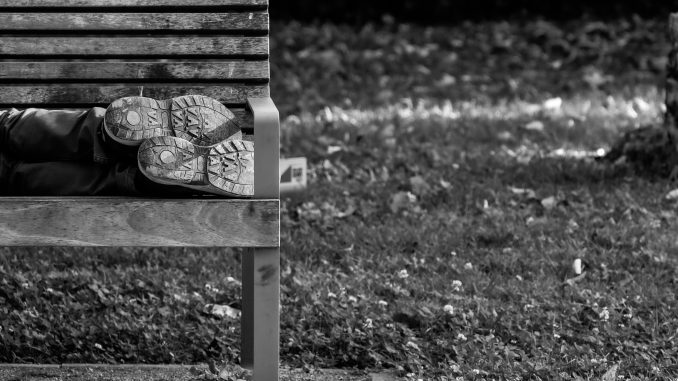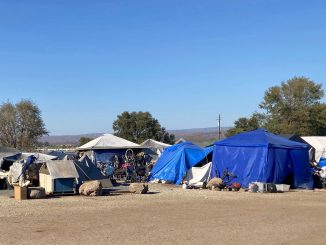
City Council loses latest legal battle against the homeless
By Ken Magri
On March 31, a federal judge issued a 29-page decision rejecting the Chico City Council’s attempt to restructure the terms of 2022’s Warren Settlement Agreement, which is a two-party contract that resolved a lawsuit filed on behalf of eight Chico homeless persons.
Specifically, this legally binding agreement settled Warren v. Chico lawsuit brought by the Legal Services of Northern California, or LSNC. The complaint alleged that the City of Chico was violating the federal and state constitutional rights of the eight homeless plaintiffs by making unlawful camping arrests, seizing property without safeguarding it, and denying proper due process.
To stop the lawsuit from going forward, the settlement agreement mandated that Chico could no longer clear out campgrounds without reasonable notification and must first make an offer of a shelter bed. It also mandated that shelter bed availability be accounted for on a regular basis.
Set to expire in January, 2027, the settlement agreement is being overseen by US District Court for the Eastern District of California Judge Dale Drozd.
Last September, the city council’s conservative majority voted 6 to 1 to take the agreement back to court, asking Judge Drozd to overrule its provisions based on a newly announced 2024 US Supreme Court ruling called “City of Grants Pass vs. Johnson.” The Grants Pass ruling allowed for more aggressive anti-camping enforcement, similar to the approach Chico’s conservative city council majority wanted.
But that Supreme Court decision did not change the nature of the settlement agreement which constituted a binding contract that Chico willfully signed onto, according to Judge Drozd’s ruling.
“Accordingly, the court will deny defendants’ motion for relief from the Settlement Agreement brought pursuant to Rule 60(b)(6),” was the judge’s final statement.
The ruling was applauded by the three progressive city council members who now sit on the dais, Addison Winslow, Bryce Goldstein and Katie Hawley.
“Since last summer, the city bet everything on this legal action,” said Councilmember Winslow, the only one to vote against going back to court last September. In Winslow’s view, the council majority “had to reinforce the case that the Settlement Agreement was ‘unworkable’ by refusing to work to make it better.”
Councilmember Goldstein concurred, adding, “The judge’s motion confirms what we already know: that the City has more work to do towards solving homelessness.”
Goldstein went on, “I don’t like that we as a city were so historically ineffective at addressing homelessness for years that we were eventually sued and forced into taking action by a federal judge. However, since that is our reality, it benefits all citizens of Chico, housed or not, that we continue operating under the guidance of the settlement agreement.”
Goldstein pointed out that the agreement is the reason why Chico now has the Genesis Pallet Shelter, a major step Chico has taken to address homelessness in the city.
Councilmember Hawley also agreed that the ruling confirms the fairness of the settlement agreement.
“Right now, I absolutely respect the judicial process and understand the logic in the ruling,” Hawley reflected. “The situation the city is in is unfortunate and limits our autonomy, but I hope it teaches council that our solutions need to be diversified.”
But conservative Councilmember Mike O’Brien did not agree with the judge’s decision.
“While I respect the judicial process, I was disappointed with the ruling,” O’Brien acknowledged, “as I assume all who favor both compassion and accountability regarding this issue were.”
He went on to elaborate: “The City and our partners have done a tremendous job on the compassion side. We have many examples of that, beginning with the Genesis Shelter.”
O’Brien felt that, in light of the Grants Pass ruling, Chico was only seeking to bring safety and sanity back to local parks, bike paths and waterways.
“Unfortunately, the city’s position, and what I believe to be the prevailing position of our community, did not win with this ruling,” O’Brien contended. “However, I remain hopeful that some common ground may be found between the parties that will benefit all in our community moving forward.”
On March 4, the city council approved formation of a new ad-hoc committee based on Councilmember Goldstein’s request for a fresh look at Chico’s homelessness problem.
But in light of this ruling, will any new committee find common ground on how to proceed?
Mayor Kasey Reynolds made the motion to create this committee and will serve as its chairperson. Goldstein and O’Brien will also serve on the committee, which has yet to convene or even schedule a meeting.
Goldstein characterized the month-long delay as “a little concerning due to the initial hope that we would meet promptly and determine recommendations by June.”
Reynolds was also part of the 2024 city council majority that voted last September to legally challenge the settlement agreement. News & Review tried several times, but was not able to get a comment from Reynolds. Likewise, Councilmember Tom Van Overbeek and Vice Mayor Dale Bennett, who had also voted to legally challenge the agreement, did not respond to a request for comment on the new ruling.
But those who want a more imaginative approach to helping Chico’s unhoused expressed more hopefulness.
“We look forward to continuing to work with the city to improve conditions and access to shelter for Chico’s unhoused residents, particularly by increasing opportunities for unhoused people to enter the [Genesis] Pallet Shelter,” LSNC Managing Attorney Kate Waldrip said in a statement. “The overwhelming majority of unhoused people who have talked with us say they would stay at the pallet shelter if they were offered a spot, yet it is our understanding that the shelter has never once filled since it opened.”
Councilmember Winslow is one of those who are optimistic now about new approaches.
“We have the opportunity now, as a new city council, to clarify what our priorities are, hone in on them, and work with the other party to achieve those,” Winslow asserted. “We all agree that fire safety is a top priority. Other issues we’ve discussed like off-leash dogs and camps blocking bike paths are totally resolvable without compromising respect for people’s basic dignity.”


disgusting. Chico was a nice place…..
Reading how the pallet shelter has never posted a no vacancy sign is not surprising. I couldn’t find the original news story, but the rules to live there were strict. I remember there was no alcohol, drugs, or being human allowed, among other things.
Drugs, I can understand (sort of maybe), but if I’m homeless and I like a beer or a glass of wine with my meal, it doesn’t make me an alcoholic. And even if I were, what business would it be of the pallet shelter manager or anyone who makes the rules? Give people a break. I’ve been homeless. It’s awful. Or, at the very least, no fun. The community built the pallet shelter to help people escape the rain, cold, and blast-furnace heat of summer. If the manager can’t find tenets, throw the bum out. And while the community is at it, put out an “Under New Management” sign.
A community leader recently, was heard to say, that the shelter crisis in Chico is a political issue.
We submit that in light of our unprecedented high rate of deaths outside our shelter crisis is also
a humanitarian issue.
The research says that the number of elderly homeless people will nearly triple in the next four years.